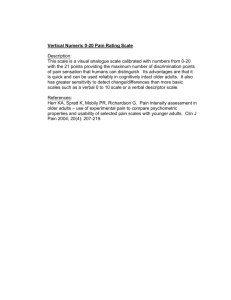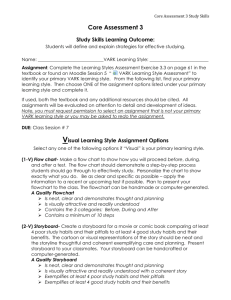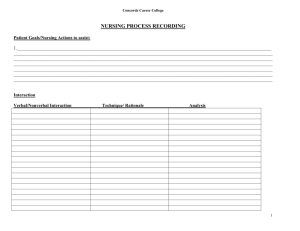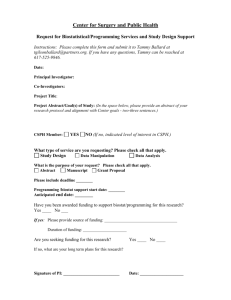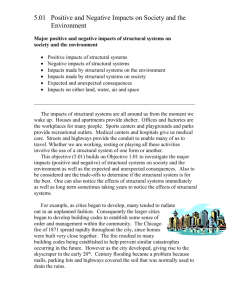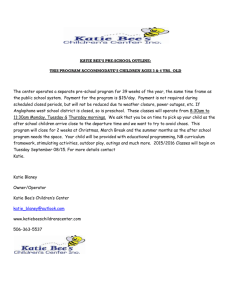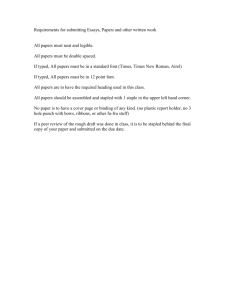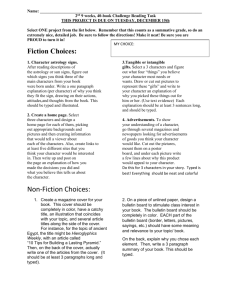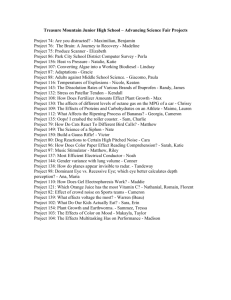Learning Outcome - Nash Community College
advertisement
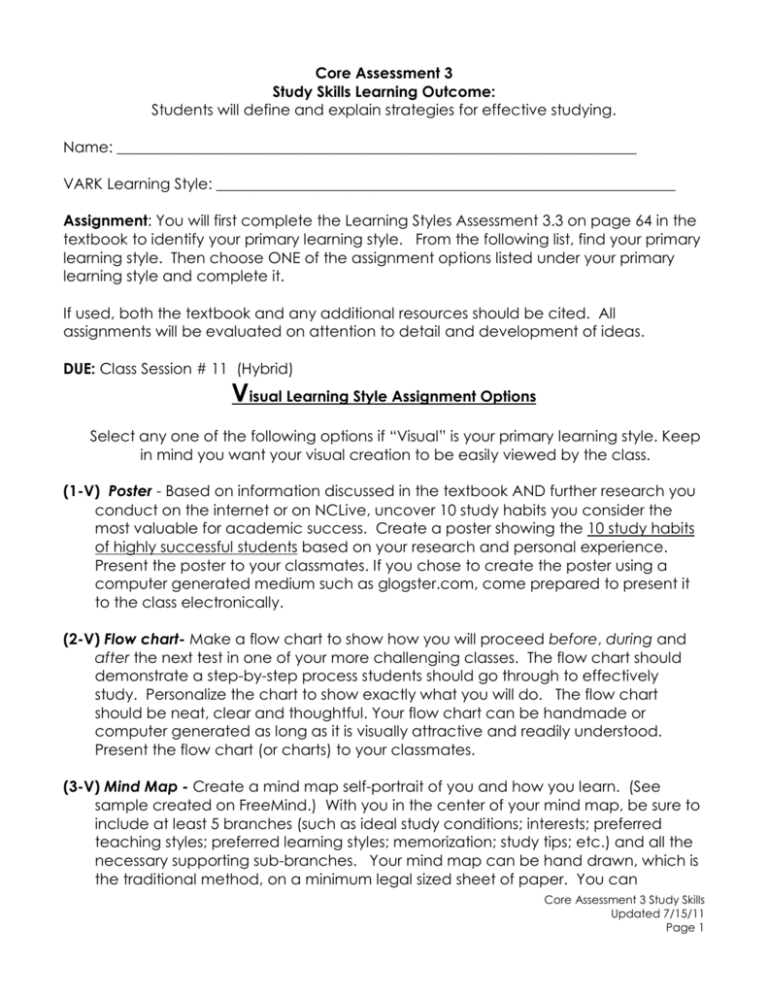
Core Assessment 3 Study Skills Learning Outcome: Students will define and explain strategies for effective studying. Name: _____________________________________________________________________ VARK Learning Style: _____________________________________________________________ Assignment: You will first complete the Learning Styles Assessment 3.3 on page 64 in the textbook to identify your primary learning style. From the following list, find your primary learning style. Then choose ONE of the assignment options listed under your primary learning style and complete it. If used, both the textbook and any additional resources should be cited. All assignments will be evaluated on attention to detail and development of ideas. DUE: Class Session # 11 (Hybrid) Visual Learning Style Assignment Options Select any one of the following options if “Visual” is your primary learning style. Keep in mind you want your visual creation to be easily viewed by the class. (1-V) Poster - Based on information discussed in the textbook AND further research you conduct on the internet or on NCLive, uncover 10 study habits you consider the most valuable for academic success. Create a poster showing the 10 study habits of highly successful students based on your research and personal experience. Present the poster to your classmates. If you chose to create the poster using a computer generated medium such as glogster.com, come prepared to present it to the class electronically. (2-V) Flow chart- Make a flow chart to show how you will proceed before, during and after the next test in one of your more challenging classes. The flow chart should demonstrate a step-by-step process students should go through to effectively study. Personalize the chart to show exactly what you will do. The flow chart should be neat, clear and thoughtful. Your flow chart can be handmade or computer generated as long as it is visually attractive and readily understood. Present the flow chart (or charts) to your classmates. (3-V) Mind Map - Create a mind map self-portrait of you and how you learn. (See sample created on FreeMind.) With you in the center of your mind map, be sure to include at least 5 branches (such as ideal study conditions; interests; preferred teaching styles; preferred learning styles; memorization; study tips; etc.) and all the necessary supporting sub-branches. Your mind map can be hand drawn, which is the traditional method, on a minimum legal sized sheet of paper. You can Core Assessment 3 Study Skills Updated 7/15/11 Page 1 download several free mind map software programs if you want to create a computer generated mind map. All submissions should follow the guidelines for good mind map structure including using color and pictures. Care should be evident in its creation. Present your mind map to your classmates. (4-V) Storyboard- Create a storyboard for a movie or comic book comparing poor study habits and their pitfalls to good study habits and their benefits. The cartoon or visual representations of the story should be neat and the storyline thoughtful and coherent exemplifying care and planning. Your storyboard can be neatly handcrafted or incorporate digital media. Present storyboard to your classmates. (5-V) Diagram - Compare studying in a group with studying on your own. Conduct research in order to understand the following: What are the benefits of both? What are the drawbacks? Create a diagram comparing the two. Consider a Venn diagram. Be prepared to present your findings and diagram to the class. (6-V) Chart – Keep a log of how you spend your time in one week. Record everything! Compile the results. Make a chart comparing how much time you spend on different activities. Analyze the results. Make a second chart or table with proposed changes to make your study time more productive. Along with the two charts, submit your log and present your findings to the class. Aural Learning Style Assignment Options Select any one of the following options if “Aural” is your primary learning style. (1-A) Learning-Style Discussion- Discuss your VARK preferences that affect learning with your family or friends. Do they agree with the results? See if they can predict their own scores. Discuss at least 3 study strategies you have employed and at least 3 new study strategies you will try to incorporate based on your learning style. Consider the 10 conditions for optimal learning (page 52-56). For each of your classes, reflect on the 10 conditions and see if they are being met. If not, discuss suggestions to help create the optimal condition to improve your learning. See if your family or friends agree with your plan. In conjunction with your family or friends, complete and submit a Learning-Style Discussion Survey. Your family and friends will jointly complete the participant portion. You will complete the ACA 115 student portion. (2-A) Post-Class Discussion- Invite a classmate for coffee or a soft drink immediately after class to talk over the lecture you’ve just finished listening to. Did you hear the same thing? What do each of you consider the lecture’s main points? Compare notes and fill in missing gaps, generate new questions and discuss main essential information. In conjunction with the classmate, complete and submit the Post-Class Discussion Survey and a copy of your notes from the class you discussed. Your Core Assessment 3 Study Skills Updated 7/15/11 Page 2 classmate will complete the discussion participant portion. You will complete the ACA 115 student portion. (3-A) Teach it! - Reconstruct one of your instructor’s lectures and then present the lecture yourself in your own words to someone else. Submit an outline or notes of your reconstructed lecture. Complete and submit the Teach It Survey Form. Be prepared to briefly explain how you felt this assignment went in terms of a study technique. (4-A) Radio Show- Create and record a radio show or podcast. Your show could be a call-in show with questions you answer or a public service announcement / infomercial. The topic should relate to information covered in either Ch. 3, 8 or 9. Make sure at least four main ideas from one of those chapters are examined. The length of the final product (show or infomercial) should be between 3-5 minutes. Bring an audio copy to play in class. Special note, consider using the college’s radio station to help with your project or possibly broadcast it when complete! The radio station is located in the lobby of the S&T building, phone, 451-8486 or email at nashradio@st.nashcc.edu. (5-A) Peer Interview- Select a student you feel exhibits model study habits or academic performance and interview them. If they are not in ACA 115, have them complete the VARK on page 64. The final assignment needs to be typed and in complete sentences. Using the following questions, type your fellow student’s response and then complete a 7-10 sentence reflection on how you can use the information from the interview to make you a better learner. Detail counts! 1. What type of learner are you? How have you made adjustments when your learning style was in conflict with an instructor’s teaching style? 2. Describe your ideal study environment. 3. Please describe each class you are taking and indicate how long you study for each one. 4. What things interrupt your studies, and how do you deal with those distractions? 5. What specific study techniques do you use when preparing for a test? 6. How do you approach a major writing assignment? 7. How far in advance do you begin studying for a test? 8. Briefly describe what NCC professors can do to meet your learning style needs. (6-A) Audio Summary- Listen to the audio summaries for all three chapters: 3, 8 and 9. Each summary is no more than 5 minutes long. The audio summaries are located on CampusCruiser under shared files/AUDIO chapter summaries. After you listen to the summaries, complete the Audio Summary Worksheet. It will include both Core Assessment 3 Study Skills Updated 7/15/11 Page 3 questions on the content of the summary and your experience using the summaries. Read/Write Learning Style Assignment Options Select any one of the following options if “Read/Write” is your primary learning style. (1-R) Case Study- Select one of the following student case stories: Ch. 3 “Tammy Ko”; Ch. 8 “Kevin Baxter”; or Ch. 9 “Katie Alexander.” Read the case study and the supporting material in the chapter. Then type a minimum 2-page report on your selected case study answering the following questions. Tammy Ko 1. What do you have in common with Tammy? How are you managing the situation so you can be successful? 2. Is Tammy smart? If so, in what ways? What is she particularly good at? What multiple intelligences seem to be her strong suit? 3. What sensory modality does Tammy prefer for taking in information? Does she learn best by viewing information through charts and graphs, by talking and listening, by reading and writing or by actually doing things? How are you able to draw that conclusion? 4. What are the differences between Mr. Caldwell’s teaching style and Tammy’s learning style? How do these differences affect Tammy’s learning? 5. What should Tammy do to become a better learner in Mr. Caldwell’s class? 6. Consider the possible outcomes for Tammy and finish your paper with a paragraph or two ending Tammy’s story and the case study. Kevin Baxter 1. What do you have in common with Kevin? How are you managing the situation so you can be successful? 2. Why is Kevin experiencing problems remembering course content in his philosophy class? List 5 reasons you identify from the case study. 3. Is Kevin too old to learn? Why or why not? 4. Identify, discuss and exemplify five memory techniques that Kevin could use to help him memorize all the names and terms he needs to know. 5. Consider the possible outcomes for Kevin and finish your paper with a paragraph or two ending Kevin’s story and the case study. Katie Alexander 1. What do you have in common with Katie? How are you managing the situation so you can be successful? 2. Katie is probably an intelligent student, but she has decided that she dislikes reading and studying, so she avoids it. Elaborate on how important these two skills will be as she continues to pursue a college degree? Is she likely to succeed her second time around? Why or why not? Core Assessment 3 Study Skills Updated 7/15/11 Page 4 3. How would you characterize Katie as a student? Identify five specific problems described in the case study that could interfere with her college success. 4. Identify three specific things Katie should do to get her college career on track. 5. Consider the possible outcomes for Katie and finish your paper with a paragraph or two ending Katie’s story and the case study. (2-R) Extra! Extra! Read All About it!-Type a newspaper article or press release describing your ideal performance on an upcoming exam. Don’t forget the catchy headline and supporting details. For example, “Southern First-year Student Aces Exam by Trying New Study Techniques.” Then describe the new techniques used. Your article should be at least 600 words, identify at least four techniques, and include quotes and one outside source. Be creative! (3-R) Survey Says!- Create a survey to discover the most popular ways that students study at Nash. Ask students how, when and where they study. Ask them to identify their greatest study or learning challenges in one of their courses this term. Tally the results. Based on the results, create a minimum 1-page essay of how to study effectively. Create it based on the shortcomings of their methods of studying. Also, include tips on how they can overcome their learning challenges. Remember to cite your sources. Submit the survey, results and essay. Everything should be typed. (4-R) Write a Script- Write and type a script for a movie or play comparing poor study habits and their pitfalls to good study habits and their benefits. The storyline should be thoughtful and coherent exemplifying care and planning. (5-R) Internet Research & Resources- Search the internet for useful sites for help with studying. Which sites offer the most practical and complete tips? Summarize findings in a typed hand out you will share with all of your classmates. Make sure each site is described in detail using your own words and includes examples of the useful information found at the site. Include all references for easy access. The hand out should be a minimum of two pages. (6-R) Book & Quote- Select chapter 3, 8 or 9 to read. Then find a book or scholarly article from NClive that extends the ideas presented in your selected chapter. Type a 2-page summary highlighting the passages that impress you from the found book or journal article. Also, find a quote (from any source of your choosing) that you find has significant relevance and meaning for the chapter you selected. Include it in your summary and explain how it exemplifies the material in the chapter. Remember, the summary should be in your own words and should include the name of the article or book and its author(s). Use quotation marks for any information you type that is word for word from the book or article. Core Assessment 3 Study Skills Updated 7/15/11 Page 5 (7-R) Chapter Summary- Based on Chapter 3, summarize you as a learner. Focus on what you learned about yourself from the chapter assessments. Type a minimum 2page summary of yourself as a learner followed by at least 4 key strategies you consider important and relevant to your learning style or desired study skills acquisition. These strategies can come from chapter 3, 8 or 9 as well as a source outside the text. If you use a source outside the text, please provide the title and author of that source when you refer to information from it. Finally, describe how you will incorporate these strategies into your study routine. Kinesthetic Learning Style Assignment Options Select any one of the following options if “Kinesthetic” is your primary learning style. (1-K) Show off- Demonstrate four memory or study techniques that work for you in front of class. Your demonstration should include visual aids that exemplify care and planning. Let your classmates guess what you’re trying to portray. (2-K) Television show- Conduct on-the-spot fake television news interviews on campus with a friend. Act like a reporter copying down information. Ask students for the number one reason they have trouble academically (is it taking notes, studying…etc?) Bring your results to class and role-play giving the news report on TV. For example, during class you would be the live TV anchor and “cut-away” to show the recorded interviews. As another option, you could create an entire TV segment in “60 minutes” fashion and show that in class. On the other hand, you don’t have to tape the interviews and could role-play the entire news story. The overall segment should be approximately 5 minutes. Note, you could consider tying in with the college television show Nash In Action also located at the radio station in the S&T building, phone, 451-8486 or email at nashradio@st.nashcc.edu. (3-K) Demonstration- Use a variety of kinesthetic learning techniques to prepare for an upcoming quiz or exam. If you do not have an upcoming quiz or test to exemplify, then describe and demonstrate how you creatively and kinesthetically study. In a well-prepared presentation, including visual aids, report your methods and results. You need a thoughtfully chosen or crafted visual aid for each technique. Grading emphasis will be placed on both the content and delivery of the presentation. (4-K) YouTube Video- Create a video ready to show the class. The video should be 3-5 minutes in length and highlight and elaborate on the key concepts of either Chapter 3, 8 or 9. Your video should be tasteful, exemplifying quality effort, planning and execution. The format of your video is limited by your creativity; it could be a scene, music video, infomercial, etc. You could consider tying in with the college television show Nash In Action also located at the radio station in the S&T building, phone, 451-8486 or email at nashradio@st.nashcc.edu. Core Assessment 3 Study Skills Updated 7/15/11 Page 6 (5-K) Game-Develop an interactive game the class will play or watch others play that teaches concepts from chapter 3, 8 or 9. For example, you could create a game of Jeopardy, Wheel of Fortune or Are You Smarter than a 5th Grader?-- just to suggest a few. You are expected to provide the materials for actual play. Make sure the game covers the necessary content, is neat, and easily seen by the class. (6-K) Scrapbook-Create a colorful, dynamic scrapbook that shows a portrait of you and how you learn. It should include a comparison of your poor and good study habits. Include at least three new techniques you will try. (7-K) Case Study Dramatization- Select one of the following student case stories: Ch. 3 “Tammy Ko”; Ch. 8 “Kevin Baxter”; or Ch. 9 “Katie Alexander.” Read the case study and the supporting material in the chapter. Then prepare a scene acting out their problem. Then, using tips from the chapter appropriate to their situation, consider the possible outcomes for your selected student and act out a possible ending scenario for the case study. Perform the scene. Submit your script or notes. (8-K) Field Trip- Go on a field trip to a tutoring facility off campus such as Sylvan Learning Center. Gather as much information as you can about how they help people study, learn and perform better academically. What obstacles do many of their clients face? What techniques seem to work best? Type a minimum 2-page paper or plan a 3-5 minute PowerPoint presentation to explain what you discovered to the class. (9-K) Webpage-Create a Web Page that is at least one page long. The focus of your Web Page is highlighting good study tips that work for you. The tips should be detailed and relate to key concepts from chapters 3, 8 or 9. There should be at least four tips with detail and examples. You should include at least 4 links (one per tip). The Web Page should be visually appealing, easy to navigate, organized, and accurate with properly cited content. You will show the Web Page to the class. Note, you are expected to create a webpage prototype but actually publishing it to the web is optional. RESOURCES FOR ALL ASSIGNMENT OPTIONS 1. glogster.com : A Glog is an interactive visual platform in which users create a “poster or web page” containing multimedia elements including: text, audio, video, images, graphics, drawings, and data. http://www.glogster.com/ 2. Comic Creator: If you just search comic creator, you may find several websites to help you develop a storyboard, comic strip etc. Once such link is http://www.readwritethink.org/files/resources/interactives/comic/index.html Core Assessment 3 Study Skills Updated 7/15/11 Page 7 3. Xtranormal: With Xtranormal, you can create animated movies. You simply select certain settings, type dialogue and action and cool stuff happens. For example, there is a “superheroes” Geico commercial running that was created using Xtranormal. You will need to create an account, and there is a cost based on the “points” used in creating your movie. You pay for your movie once you “publish” it. However, you don’t have to pay while a movie is “in progress” so you could experiment to see if it is worthwhile to you. http://www.xtranormal.com/ 4. Digital Story Telling: Explore this link for developing a digital storyboard.: http://courseweb.lis.illinois.edu/~jevogel2/lis506/howto.html It includes both guidelines to digital story board creation and links to free software. 5. Blogging: www.blogger.com This works seamlessly with google/gmail. 6. Podcasting: http://audacity.sourceforge.net/ is a website for audio only podcasting. Easy to use. You can record sound, edit sound and save files in multiple formats. 7. Mind Mapping: There are several free mind mapping software programs available. The one used in the example came from Freemind. http://freemind.en.softonic.com/ 8. Webpage: There are several software programs that you may choose to use for developing web pages such as Dreamweaver. You can also search the internet for webpage templates and find several free sites. Once such option is http://www.wix.com/create/website Core Assessment 3 Study Skills Updated 7/15/11 Page 8 ACA 115 Study Skills CORE ASSESSMENT 3 EVALUATION RUBRIC Student Name_________________________________________ Learning Style Evaluated: Visual Aural Read/Write Kinesthetic Specific Assignment Completed: _________________________________________ Student completes the VARK Learning Styles Assessment. 20 VISUAL Student completes one of the VISUAL learning style assignments. 20 Student follows the assignment-specific instructions. (it is typed if required; includes citation of sources if required; includes any required documentation or visual aid, etc.) Student’s assignment is well executed, accurate, neat, and organized. It demonstrates planning, effort and attention to detail. Student’s assignment demonstrates a higher level of thought and depth of understanding for the study process and learning style. AURAL Student completes one of the AURAL learning style assignments. 0-20 0-20 20 Student follows the assignment-specific instructions. (it is typed if required; includes citation of sources if required; includes any required documentation or visual aid, etc.) Student’s assignment is well executed, accurate, neat, and organized. It demonstrates planning, effort and attention to detail. Student’s assignment demonstrates a higher level of thought and depth of understanding for the study process and learning style. READ/WRITE Student completes one of the READ/WRITE learning style assignments. 0-20 0-20 0-20 20 Student follows the assignment-specific instructions. (it is typed if required; includes citation of sources if required; includes any required documentation or visual aid, etc.) Student’s assignment is well executed, accurate, neat, and organized. It demonstrates planning, effort and attention to detail. Student’s assignment demonstrates a higher level of thought and depth of understanding for the study process and learning style. KINESTHETIC Student completes one of the KINESTHETIC learning style assignments. 0-20 0-20 0-20 20 Student follows the assignment-specific instructions. (it is typed if required; includes citation of sources if required; includes any required documentation or visual aid, etc.) Student’s assignment is well executed, accurate, neat, and organized. It demonstrates planning, effort and attention to detail. Student’s assignment demonstrates a higher level of thought and depth of understanding for the study process and learning style. TOTAL POINTS LETTER GRADE RUBRIC SCORE 0-20 0-20 0-20 0-20 (0-100) (1-4) CORE EVALUATION RUBRIC GRADE RANGE 90-100 80-89 60-79 0-59 RUBRIC SCORE 4 3 2 1 DESCRIPTION Exceeds Expectations Meets Expectations Partially Meets Expectations Did Not Meet Expectations Core Assessment 3 Study Skills Updated 7/15/11 Page 9 Basic Mind Map Sample for optional VISUAL assignment 3-V Core Assessment 3 Study Skills Updated 7/15/11 Page 10
